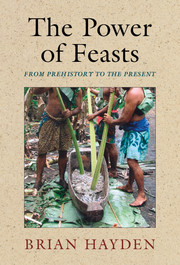Book contents
- Frontmatter
- Contents
- List of Figures
- Acknowledgments
- 1 Before the Feast
- 2 Food Sharing and the Primate Origins of Feasting
- 3 Simple Hunter/Gatherers
- 4 Transegalitarian Hunter/Gatherers
- 5 Domesticating Plants and Animals for Feasts
- 6 The Horticultural Explosion
- 7 Chiefs Up the Ante
- 8 Feasting in Early States and Empires
- 9 Industrial Feasting
- References Cited
- Index
2 - Food Sharing and the Primate Origins of Feasting
Published online by Cambridge University Press: 05 October 2014
- Frontmatter
- Contents
- List of Figures
- Acknowledgments
- 1 Before the Feast
- 2 Food Sharing and the Primate Origins of Feasting
- 3 Simple Hunter/Gatherers
- 4 Transegalitarian Hunter/Gatherers
- 5 Domesticating Plants and Animals for Feasts
- 6 The Horticultural Explosion
- 7 Chiefs Up the Ante
- 8 Feasting in Early States and Empires
- 9 Industrial Feasting
- References Cited
- Index
Summary
Food sharing is arguably the foundation from which feasting emerged, and it should be considered as one form of food sharing behavior. Food sharing among nonkin is viewed as one of the hallmarks of human evolution and a core feature of human societies (Gurven 2004; Stevens and Gilby 2004; Bullinger et al. 2013:51). It is considered by some to be the prime mover in social evolution from proto-hominids to modern humans in terms of its possible role in developing cooperation, sociality, sexual division of labor, morality, altruism, and perhaps human economic systems (Isaac 1978; Kurland and Beckerman 1985; Gurven et al. 2000a,b; Dubuc et al. 2012:73). Yet the roots of food sharing appear to go deeper and to have emerged among our nonhuman primate ancestors.
Food sharing with kin is relatively common in the animal kingdom (especially mother–offspring sharing), yet food sharing with nonkin among most nonhuman species is absent or very rare, although it does occur to some degree among some nonhuman primate relatives, particularly our closest ancestors, chimpanzees. Food sharing among nonkin does not appear to occur otherwise in the animal kingdom. Understanding why sharing food with nonkin occurs has become a major and controversial area of research. Like feasting, food sharing involves a fundamental paradox: why individuals give away valuable fitness-enhancing food resources (Gurven et al. 2000a:173; 2000b:264). In this chapter, I review some of the contending models regarding the underlying motivations and benefits of food sharing behavior, and I explore the implications of this for the evolution of feasting as one form of food sharing behavior.
- Type
- Chapter
- Information
- The Power of FeastsFrom Prehistory to the Present, pp. 25 - 34Publisher: Cambridge University PressPrint publication year: 2014



